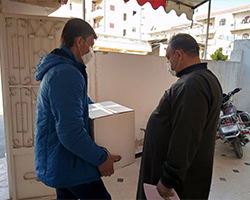WHO and the International Organization for Migration join forces to fight TB in north-west Syria

WHO/Mohammed Zeidan
Three WHO-established tuberculosis (TB) centres in north-west Syria have been serving the needs of hundreds of conflict-affected families, including internally displaced people, since summer 2019. In February 2021, the International Organization for Migration (IOM) joined this project to help ensure the highest possible recovery rate of 300 TB patients every month through the provision of adequate food.
Located in the cities of Azaz, Idlib and Afrin, the TB centres are equipped with essential medical supplies, including X-ray and microscopy laboratories run by WHO-trained medical doctors and laboratory technicians. Patients from those cities, as well as other parts of the 2 governorates, have been referred to these centres to receive quality TB care.
“In mid-2018, WHO conducted an assessment of available TB services in north-west Syria,” explained Dr Mahmoud Daher, WHO Health Emergencies Programme Team Lead and Head of the Gaziantep Field Presence. “The assessment revealed that more could be done to improve data reliability and the surveillance system to detect people affected with drug-resistant TB.”
Dr Daher added that there was also a need to identify a responsible entity for the existing TB services, “to ensure adequate TB medication stockpiling, improve diagnostic services, and increase knowledge for proper TB treatment and management among clinical staff”.
Food packages recommended to help TB patients
Despite significant progress in treatment outcomes since the establishment of the TB centres, the condition of patients is still influenced by harsh socioeconomic factors. TB patients in north-west Syria are mainly displaced people whose lives have been uprooted by conflict and who face tremendous hardship daily, including a chronic lack of food.
Malnutrition is one of the main causes of disease, as patients are physically weak and struggle to recover. In order to achieve comprehensive TB treatment outcomes, regular and steady intake of medication over several months is critical and nutrition plays a key role.
IOM joined with WHO to provide supplemental food packages for TB patients in the 3 WHO-established TB centres. “IOM remains committed to improving the health and overall well-being of people forcibly displaced by conflict,” stressed Dr Mohamed Refaat, Senior Operations Coordinator at IOM. “As COVID-19 has taught us, when it comes to health, there is no ‘us versus them’, and we are all in this together.”
Monthly food baskets designed to improve TB treatment outcomes
About 300 TB patients are set to benefit monthly from food baskets that include rice, bulgur, brown lentils, red lentils, dried chickpeas, sunflower oil, salt, pasta and tomato paste. Patients diagnosed with multidrug-resistant TB receive 2 baskets per month.
The food baskets incorporate 1510 kilocalories, or 72%, of the daily recommended 2100 kilocalorie standard set by aid organizations working on the food security and livelihoods sector of the response. A single food basket is designed to cover the food needs of a household of 3 individuals for 1 month.
Food delivery and distribution are organized by the TB centres supported by WHO. Patients visit at least once a month to check on their health status with the medical doctor, make follow-up medical appointments, and receive their monthly dosage of medication as well as a food basket.
IOM is planning to procure a tool for the rapid diagnosis of TB and to provide financial support for the project to ensure the continuity of comprehensive TB services in north-west Syria.



